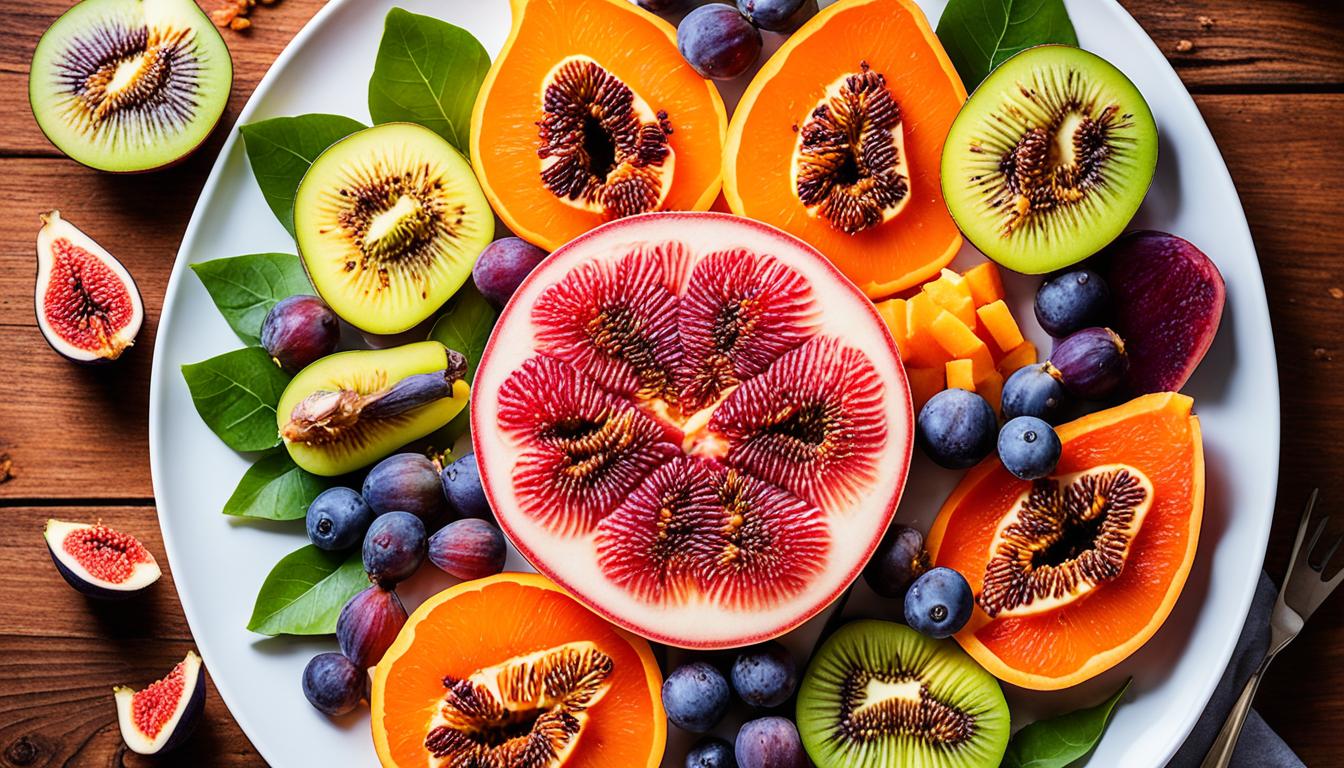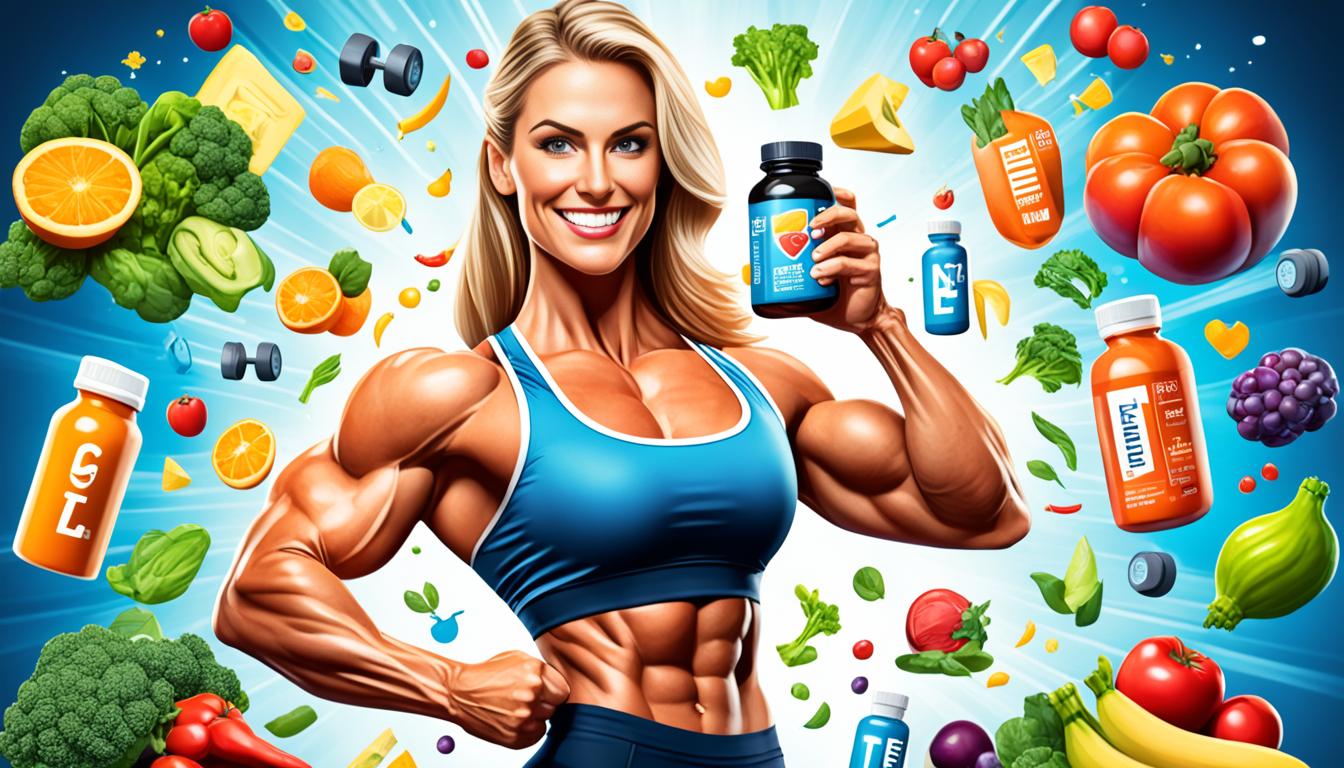Did you know guava is a protein powerhouse, serving up 4.2 grams of protein per cup? This tropical delight is only one of many unexpected fruits rich in protein. They’re perfect for boosting your nutrition and helping you reach fitness objectives. While we often think of meat and fish as key proteins, certain fruits are also pretty high. They make a great addition to your meals.
Eating more protein-rich fruits, nutrient-dense fruits, and healthy fruits can lower disease risks and aid in weight control. They’re also great for staying healthy as you get older. Even if fruits don’t have as much protein as meat, it does still add up towards your daily needs. In this article, we’ll look at the top 5 high protein fruits. They’re easy to add to your meals for a healthy boost, especially for muscle-building.
Key Takeaways
- Certain fruits, like guava, jackfruit, and avocado, contain a significant amount of protein per serving.
- Incorporating more protein-rich fruits and plant-based proteins into your diet can support tissue growth, immune function, and muscle health.
- High-protein fruits can be enjoyed on their own or incorporated into a variety of dishes to boost the overall nutritional value of your meals.
- Pairing these nutrient-dense fruits with other protein sources creates well-rounded, muscle-building meals.
- Expanding your fruit intake with a focus on high-protein fruit options is a delicious way to support your health and fitness goals.
The Importance of Protein in Your Diet
Protein is key for many body functions, like growth, repair, and staying healthy. It’s the foundation for fixing cells, tissues, and muscles. It keeps bones, teeth, and nails strong, and the immune system working right. Not getting enough protein can cause weak bones and muscles, and a weak immune system. So, it’s important to add plenty of protein-rich foods to your meals for good health.
Protein’s Role in Tissue Growth and Repair
Protein is critical for building and fixing body tissues. It works on cells, muscles, organs, and more. Getting enough protein for tissue repair is vital. It helps wounds heal faster and keeps you strong.
Protein’s Function in Immune and Muscle Health
Protein for immune health is needed too. It makes antibodies that fight sickness. It also keeps muscles strong for better physical shape.
Protein’s Contribution to Weight Management
Protein is also great for watching your weight. It helps you feel full, so you eat less. Plus, it helps keep your muscles up, which can help burn more fat.
Guava: A Tropical Protein-Rich Powerhouse
Guava is a colorful tropical fruit and stands out as a good source of protein among fruits. Every cup of guava has a hefty 4.2 grams of protein. This amount is more than what many other fruits offer. Guava is also rich in fiber, providing 9 grams of fiber in a cup. This is roughly one-third of your daily fiber intake.
Guava’s Impressive Protein Content
Having enough protein in your diet is important for growing and repairing tissue. It is also key for good body function. By adding guava to your diet, you can ensure you meet your daily protein needs. This is great for those who eat mainly plants or are vegetarians.
Additional Guava Benefits: Fiber and Potential Health Perks
Guava has more to offer than just protein and fiber. Research shows that eating guava fruit without its peel might help reduce blood sugar and better cholesterol levels in people. This means guava is a great choice for a nutritious diet.
Aside from fresh guava fruit, you can also use guava puree in cooking. For example, you can make dishes like the tasty Harvest Salad with Guava Vinaigrette. This shows the many uses of this high protein tropical fruit.
Jackfruit: The Versatile Plant-Based Meat Substitute
Jackfruit comes from tropical areas like Asia, Africa, and South America. It is rich in nutrients and works well as a plant-based meat substitute. In the U.S., you can mostly find it canned. It has 2.6 grams of protein in each 1-cup, and it offers 2 grams of fiber too. Don’t forget about its potassium. The young or green jackfruit has a texture that’s just like meat. This means it takes on the taste of whatever flavors you add to it. That’s why it’s great for recipes like Jackfruit Barbacoa Burrito Bowls.
Jackfruit’s Shredded Meat-Like Texture
Jackfruit is the world’s biggest tree-borne fruit. It can weigh more than 40 pounds. The young or green jackfruit has a shredded, meat-like quality. This makes it perfect for taking on different flavors. You can use it in all sorts of meals, from starters to sweet treats.
Nutrient Profile of Jackfruit
Jackfruit is packed with nutrients. Every 100 grams have 95 calories. You’ll find 2 grams of protein and 0.6 grams of fat. Plus, it provides 3 grams of fiber. It’s a top source of vitamins C, B6, B3, B2, B9, and minerals like calcium, magnesium, potassium, and phosphorus. Compared to most fruits, it has a lot more protein. So, it’s an interesting choice in a world where fruits are mainly carbs.
Blackberries: A Delicious Dose of Protein and Antioxidants
Blackberries are a great way to add fiber and protein to your diet. They have more protein than most berries. For example, a cup of blackberries has about 2.1 grams of protein. This is almost double what you’ll find in a cup of blueberries. They are also high in anthocyanins, which help your heart and brain.
A one-cup serving offers 8 grams of fiber. This makes them good for meals that need a protein boost, like Blackberry BBQ Pork Chops with Collards & Corn.
One cup of raw blackberries has 30.2 milligrams of vitamin C. That’s half of what you need in a day. It also has nearly 8 grams of fiber, which is good for your cholesterol and sugar levels. Plus, you get almost 29 micrograms of vitamin K, over a third of the daily value, and 0.9 milligrams of manganese, almost half of what you need each day.
Blackberries have a low glycemic index, which means they’re good for watching your blood sugar. A cup of them has only 62 calories and 13.8 grams of carbs, but 7.6 grams of fiber. Since you should be getting 25 to 40 grams of fiber daily, blackberries are a smart choice to add.
| Nutrient | Amount in 1 Cup of Blackberries | Percentage of Daily Value |
|---|---|---|
| Protein | 2.1 grams | – |
| Fiber | 7.6 grams | 30-32% |
| Vitamin C | 30.2 milligrams | 50% |
| Vitamin K | 29 micrograms | 37% |
| Manganese | 0.9 milligrams | 45% |
A study with 150 people found that anthocyanin supplements were good for health. Those who took them had lower inflammation and better cholesterol after 24 weeks. For good health, aim for two servings of fruit daily. Blackberries are an excellent choice for this.
Avocado: The Creamy Superfood with a Protein Punch
Avocados are a hit on social media and pack 1.5 grams of protein in half a piece. They are also rich in healthy fats and potassium. Besides topping your toast, you can add avocados to salads, make spreads, or eat them by themselves with lemon, salt, and pepper.
Avocado’s Healthy Fat and Potassium Content
These fruits are full of good fats and low in the bad ones. They have no cholesterol or sodium. Avocados are a top source of oleic acid, which fights inflammation and helps your cholesterol. One serving gives you 26% of your daily vitamin K, 20% of folate, and 14% of potassium.
Creative Ways to Enjoy Avocados
Besides toast, there are many fun ways to eat avocados. You can mix them in salads, use them as spreads, or eat them alone with some seasoning. Blend them into a smoothie with banana, kale, and almond milk for a good, creamy snack. This drink is rich in protein and keeps you full.
top 5 high protein fruits
Pomegranate: A Ruby-Red Gem with Hidden Protein
Pomegranate arils, or seeds, shine as secret sources of protein. Just half a cup of pomegranate arils gives you 1.5 grams of protein. They also pack 3.5 grams of fiber. Pomegranates are known for their rich red color, thanks to anthocyanins. These act as antioxidants, fighting inflammation and improving heart health. Plus, their sweet-tart taste makes them great in everything from salads to stews.
Incorporating Pomegranate into Savory and Sweet Dishes
Pomegranate arils are not just nutritious – they’re delicious. Kickstart your day by adding them to yogurt or oatmeal. In meals, they bring salads, bowls, and roasted veggies to life. Looking for a dessert? Mix them in smoothies or sorbets. You can even pour the juice over fruit for a colorful, healthy sweet dish.
Maximizing Protein Intake with Fruit
Some fruits like jackfruit, guava, and avocado have more protein per typical serving than others. But they are still not very high in source of protein on their own. To get more protein, experts suggest pairing fruits with other protein sources. This can be adding Greek yogurt, cottage cheese, or even tuna to your meals.
Combining Fruits with Other Protein Sources
Here are some dietitian-approved tips: Add blackberries in yogurt or oatmeal. Instead of using jelly on toast, try sliced fruit. You can also mix canned tuna with avocado for a nutrient-dense tuna salad. By doing this, you’ll maximize your protein intake and improve your health.
Dietitian-Approved Tips for Protein-Packed Meals
| Protein Source | Protein Content |
|---|---|
| Cheddar Cheese (1 oz) | 7g |
| Eggs (3 large) | 19g |
| Almonds (1 oz) | 6g |
| Greek Yogurt (3.5 oz) | 10g |
| Whey Protein Powder (1 scoop) | 17g |
| Lean Jerky (1 oz) | 9g |
| Cottage Cheese (1 cup) | 23g |
| Edamame (1 cup) | 18.4g |
| Canned Fish (3.5 oz) | 19g |
| Quinoa (1 cup cooked) | 8g |
| White Beans (100g) | 24.5g |
| Lentils (100g) | 23g |
Adding these protein-rich fruits to the list can make your meals even better. Your health and fitness goals will thank you. By combining protein-rich fruits with these additional protein sources, you can create well-balanced, nutrient-dense meals.
Other Notable Protein-Rich Fruits
While the top 5 high protein fruits are great, let’s not forget other protein-rich ones. Apricots, with their sweet taste, have 1.4 grams of protein in 100 grams. The dried type has even more. Berries, known as nature’s treats, also offer good protein levels. Raspberries and blackberries give 1.2 and 1.4 grams per cup, respectively.
Apricots: A Sweet and Protein-Packed Stone Fruit
Apricots are known for their bright orange color and light taste. They are an excellent source of plant-based protein too. With 1.4 grams of protein in 100 grams, these juicy fruits are good for you. Dried apricots, with their concentrated sugars and proteins, are even richer in protein.
Berries: Nature’s Protein-Filled Treats
Raspberries and blackberries contain more than you might expect. For example, a cup of raspberries has 1.2 grams of protein. A cup of blackberries has 1.4 grams. These berries with good protein levels are delightful as snacks. They’re also great in breakfast smoothies or desserts. This use helps increase your diet’s protein value.
Conclusion
Fruits are not usually big on protein, but there are some exceptions. Fruits like guava, jackfruit, avocado, blackberries, and pomegranate are great for protein. You can have them as snacks or add them to meals and smoothies.
Eating these high protein fruits with other protein sources makes your meals nutritious. They help your body grow, keep your immune system strong, and help with muscles and weight. Adding more of these fruits to your diet is tasty and good for you.
Protein is key for many body parts and functions. Things like tissue growth, immune system, and muscles depend on protein. Having protein-rich foods, especially plant-based protein sources like these fruits, is very important. With these high protein fruits in your diet, you can still enjoy fruits and get your needed protein.
FAQ
What are the top 5 high protein fruits?
How much protein do these high protein fruits contain?
What are the additional health benefits of these high protein fruits?
How can these high protein fruits be incorporated into a balanced diet?
Are there any other notable protein-rich fruits worth mentioning?
Source Links
- https://www.eatingwell.com/high-protein-fruits-ranked-8628266
- https://www.webmd.com/diet/ss/slideshow-fruits-with-most-protein
- https://www.cookunity.com/blog/high-protein-fruits
- https://www.health.com/high-protein-fruits-8641680
- https://www.realsimple.com/high-protein-fruits-7963226
- https://agribotix.com/fruits-high-in-protein/
- https://timesofindia.indiatimes.com/life-style/food-news/10-fruits-that-are-the-highest-source-of-protein/photostory/68392452.cms
- https://www.healthline.com/nutrition/jackfruit-meat-alternative
- https://health.clevelandclinic.org/what-is-jackfruit-and-is-it-healthy
- https://www.healthline.com/health/benefits-of-blackberries
- https://health.clevelandclinic.org/benefits-of-blackberries
- https://thisartcalledlife.com/2018/06/08/green-avocado-smoothie/
- https://www.veganevibes.com/creamy-avocado-banana-protein-smoothie/
- https://vancouverwithlove.com/avocado-toast/
- https://www.verywellhealth.com/fruits-and-veggies-with-protein-7565608
- https://www.healthline.com/nutrition/14-ways-to-increase-protein-intake
- https://myhealthytreat.in/blogs/blog/high-protein-fruits
- https://atlasbars.com/blogs/protein-explained/fruit-highest-in-protein-exploring-fruits-with-a-high-protein-content




